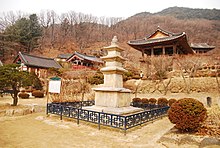| UNESCO World Heritage Site | |
|---|---|
 | |
| Location | Yeongju, Republic of Korea |
| Criteria | Cultural: iii |
| Reference | 1562-2 |
| Inscription | 2018 (42nd Session) |
| Coordinates | 36°59′56″N 128°41′15″E / 36.99889°N 128.68750°E |
| Buseoksa | |
 Muryangsujeon building of Buseok temple, No.18 of National Treasure of South Korea. | |
| Korean name | |
|---|---|
| Hangul | 부석사 |
| Hanja | |
| Revised Romanization | Buseoksa |
| McCune–Reischauer | Buseoksa |
Buseoksa Temple (Korean: 부석사; Hanja: 浮石寺) is a Buddhist temple located near Mt. Bonghwang in Buseok-myeon, Yeongju City, Gyeongsangbuk-do, founded by the prominent scholar-monk Uisang in 676, the 16th year of Munmu of Silla. Buseoksa temple is also well known as the "Temple of the Floating Stone".
Korean Huayan school was highly celebrated here by the lectures of Uisang, who was later called the respected scholar of Buseok and later the school also gained the name Buseok school.[1] The temple houses the Muryangsujeon, which is the second oldest standing wooden building in South Korea, re-constructed in 1376.
In 1372, large numbers of annexes were re-established by the great monk Won-eung at the time under King Gongmin's reign in 1376.[2] A few buildings during Goryeo era (9th century to the late 14th century) remain until now, one of which is the main hall called Muryangsujeon located at the highest level, where Amitabha is enshrined.
- ^ "부석사". mahan.wonkwang.ac.kr. Archived from the original on 2017-07-25. Retrieved 2013-01-21.
- ^ "부석사(영주)". korean.visitkorea.or.kr. Archived from the original on 2013-02-21.
